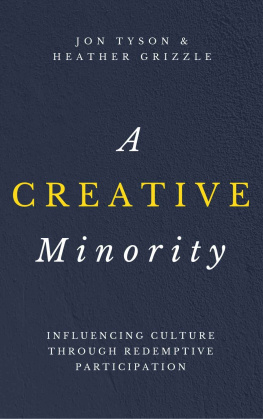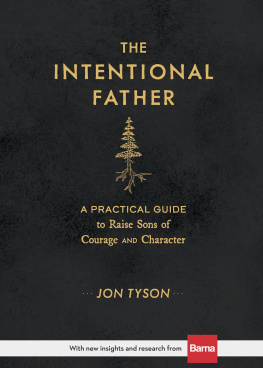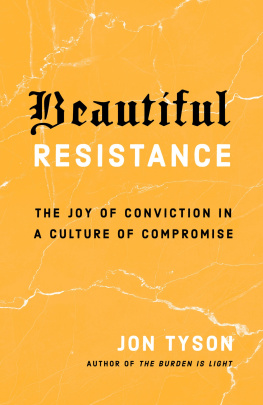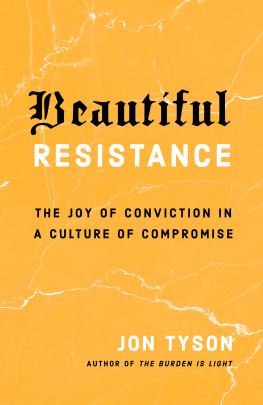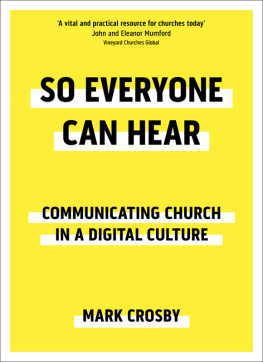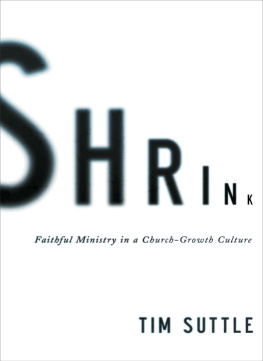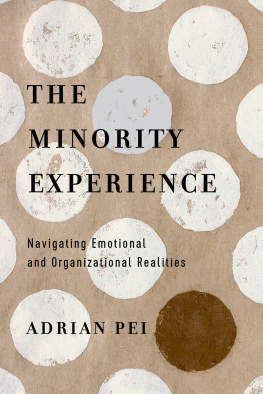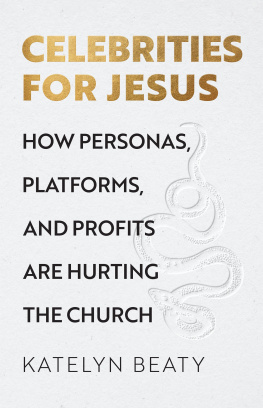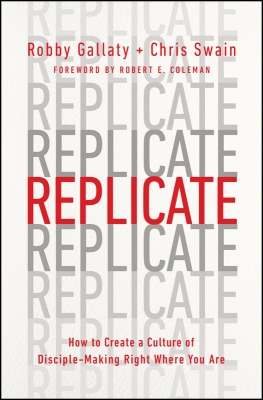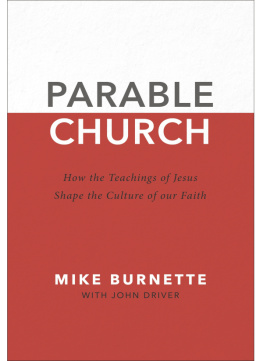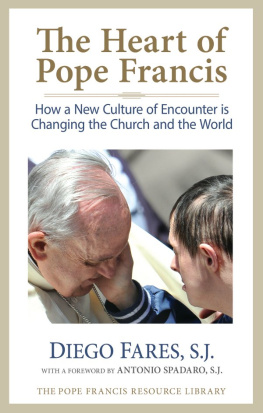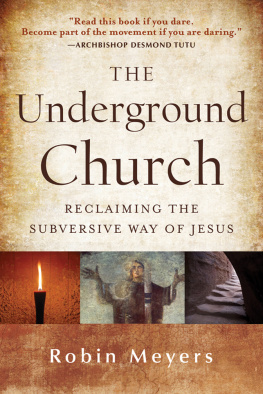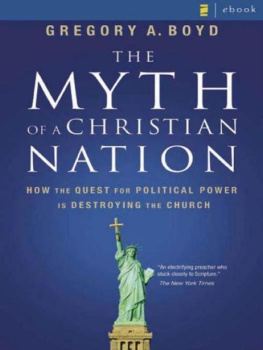A CREATIVE MINORITY:
Influencing Culture Through RedemptiveParticipation
Jon Tyson & Heather Grizzle
2016 Jon Tyson andHeather Grizzle. All rights reserved.
Tableof Contents
, Power and DestructiveMinorities
An Response to our Cultural Moment
A CreativeMinority Defining Marks
:Authentic Community over Loose Networks
: A Compelling Alternative Story
: A Distinct MoralVision
:Counter-formative Action
: A Humble Alternative Allegiance
: Exerting Redemptive Influence
A Creative Minority: Both Faithful and Presence
About the
Notes
Themost eloquent testimony to the reality of the resurrection is not an empty tombor a well-orchestrated pageant on Easter Sunday but rather a group of peoplewhose life together is so radically different, so completely changed from theway the world builds a community, that there can be no explanation other thanthat something decisive has happened in history.
-- Will Willimon
How shouldthe church engage our culture? Many talk about becoming more missional, othersabout taking our culture back, but it has been my experience that the typical Christian,rather than feeling fired up or threatened by these ideological campaignssimply feels sad, confused and overwhelmed. The recent political cycle hasshattered the lens through which the American church has looked at politicsthrough much of our lifetimes. We know biblically that Jesus is the Lord ofheaven and earth, and we know he cares about the kind of world we are creating,but those theological principles seem largely disconnected from the realities weface in an increasingly post-Christian culture. Our societal problems seem so complex and nuanced that the answers wehave been given no longer seem applicable.
CHRISTIANS, POWER, AND DESTRUCTIVEMINORITIES
We not onlyfeel this obsolescence on apersonal level, but also at an institutional one. Christians rarely hold placesof honor or influence in the secular world, and in increasingly frequent cases,we actually hold a place of shame and disdain in the public square. This hasbeen deeply disorienting: America is in some ways a schizophrenic culture whenit comes to religion and public life. Everypresidential candidate is asked about their personal faith, but if they everreally built policies around the Sermon on the Mount, there might be a secondAmerican civil war. Virtually every culturally engaged Christian in Americatoday feels that tension in our jobs, in our communities, and in the broadercultural conversation. Personal faith is welcome, but expressing ourconvictions or espousing ideas as truth in public is uncouth at best, and oftentaken as coercive, intolerant, or even threatening.
Society bothsenses and fears a Christian backlash to our loss of influence, worrying that thisbacklash will come out in negative or violent ways. Beliefs that were onceconsidered soundly evangelical now appear close-minded and combative. Recent Barna Research Group polls seem to confirm these fears;they report that the two defining characteristics of Christians in terms ofcultural perception are irrelevant and extreme. What adispiriting way to be perceived out of touch and out of balance!
The furtherout of the public square we are pushed, the angrier and more frantic ourrhetoric becomes. It is as though, out of a fear of being forgotten, we seek tospan our growing distance from the center with volume and intensity rather thanengaging with intimacy. But if we are not careful, we will not be seen asbearers of good news, but rather as ideological warriors seeking to force aChristian theocracy on a resistant nation.
The rise ofISIS has been shocking and instructive. Their atrocities have been brutal inobvious ways, but also in subtler ways that have often been overlooked theyare fearful of anything that deviates from their own religious power. Beyondtheir many public executions, who can forget the pictures of ISIS members goinginto Mosuls central museum after they had taken the city and destroyingpriceless, millennia-old artifacts they deemed to be idolatrous? Their fearfulintolerance extended so far that, no less menacing than armed enemies, theyfelt the need to also destroy inanimate relics perceived to challenge theirstrict moral code. I fear that our angry and even militant rhetoric may causepeople to think that many Christians hope for something similar were we torecapture political power: destroy all that is wonderful in the nation thatAmerica has become in a fear-inspired rampage to return it to an idealized,moralistic past.
AN ALTERNATIVE RESPONSETO OUR CULTURAL MOMENT
During Jesustime on earth, the people of God faced a complex and challenging religious milieu.The Jewish people were angry and frustrated at the overwhelming power of Rome andits blatant paganism. Sincere followers of God were wrestling deeply with howto be faithful and fruitful in a place where their values were no longerwelcome. Many of those subgroups respondedin ways that are eerily similar to our cultural sects today.
The Sadduceesmade deals with the Romans - they cared about power, influence and control. Theybroke their covenantal loyalty and sold out to the oppressing empire. They cameto terms with the political and military reality, and sought to accommodate it asbest they could. The Pharisees were separatists- they functioned as a cultural police and lamentedthe decline of morality and faithfulness. Through repentance and holiness, theysought to return the people of God to their former days of influence and glory.The Essenes were appalled at the godlessness of their culture, and retreatedinto the wilderness as a means of escaping the pagan world. They believed thattheir seZcession from the corrupt system would ensuretheir personal salvation, and usher in the coming of the Son of Man. The Zealotsvision was violent and pragmatic, seeking to seize control by any meansnecessary, including violence, terrorism or holy war. Jesus Christ entered into that societal meleeand frustrated, offended and confounded every one of those strategies. He came inwith a different approach and message, one that could be called a vision of becominga Creative Minority.
I first heardthis phrase, Creative Minority in an article by UK Chief Rabbi Jonathan Sacksin describing the ways that the Jewish community has not only survived, but alsocontributed to the flourishing of the world through redemptive participation.That dual focus of faithfulness and fruitfulness is not an easy tension inwhich to live. He writes,
To become acreative minority is not easy because it involves maintaining strong links withthe outside world while staying true to your faith, seeking not merely to keepthe sacred flame burning but also to transform the larger society of which youare a part. This is a demanding and risk-laden choice.
Becoming aCreative Minority paints a compelling picture of the way the church is calledto participate in these challenging and demanding times - seeking neither tocontrol nor abandon the world, but to love it to new life through redemptiveparticipation. In applying the idea of a Creative Minority to a Christiancommunity, I describe it as follows:
A Creative Minority is aChristian community in a web of stubbornly loyal relationships, knotted togetherin a living network of persons who are committed to practicing the way of Jesustogether for the renewal of the world.
These words have been chosencarefully, and unpacking this definition will be the goal of the remainder ofthis book, but it is clear that our current vision of the Christian life,culture and the call to discipleship will need a deep re-examination. Thisexercise should be seen as an opportunity, not a threat. We need a vision thatis not based on a fear of a godless future, or a longing for an idealized past,but a rich presence in our own time that inspires the beauty and possibility ofChrists church. The goodnews is that the church has advanced and borne beautiful fruit in culturalsituations much more complex and challenging than our own. The advancement ofthe Kingdom of God does not depend on the cultural situation in which we findourselves, nor upon our own performance in response. Rather, we are invited tofollow the way of Jesus in
Next page
